

The death toll has exceeded 40,000 since the Israel-Hamas conflict broke out on Oct 7, 2023.
UNITED NATIONS - The General Assembly on Friday adopted a resolution that calls for a humanitarian truce in Gaza.
The resolution calls for "an immediate, durable and sustained humanitarian truce leading to a cessation of hostilities."
It demands "the immediate, continuous, sufficient and unhindered provision" of essential goods and services to civilians throughout the Gaza Strip, including but not limited to water, food, medical supplies, fuel and electricity.
It urges immediate, full, sustained, safe, and unhindered humanitarian access to Gaza.
It encourages the establishment of humanitarian corridors and other initiatives to facilitate the delivery of humanitarian aid to civilians in Gaza, and welcomes efforts in this regard.
The resolution demands that all parties immediately and fully comply with their obligations under international law, particularly in regard to the protection of civilians and civilian objects, and enable and facilitate humanitarian access for essential supplies and services to reach all civilians in need in Gaza.
It also calls for the rescinding of the order by Israel for Palestinian civilians and UN staff, as well as humanitarian and medical workers, to evacuate all areas in the Gaza Strip north of the Wadi Gaza and relocate to southern Gaza.
The resolution firmly rejects any attempts at the forced transfer of the Palestinian civilian population.
It calls for the immediate and unconditional release of all civilians who are being illegally held captive, demanding their safety, well-being and humane treatment in compliance with international law.
It also calls for respect and protection, consistent with international humanitarian law, of all civilian and humanitarian facilities, including hospitals and other medical facilities, as well as their means of transport and equipment, schools, places of worship, and UN facilities, as well as all humanitarian and medical personnel and journalists, media professionals and associated personnel, in armed conflict in the region.
It stresses the particularly grave impact that armed conflict has on women and children, as well as on other civilians who may have specific vulnerabilities, including persons with disabilities and older persons.
The resolution stresses the need to urgently establish a mechanism to ensure the protection of the Palestinian civilian population, in accordance with international law and the relevant UN resolutions, and further stresses the importance of a humanitarian notification mechanism to ensure the protection of UN facilities and all humanitarian installations and to ensure the unimpeded movement of aid convoys.
The resolution emphasizes the importance of preventing further destabilization and escalation of violence in the region, and in this regard calls on all parties to exercise maximum restraint and on all those with influence on them to work toward this objective.
It reaffirms that a just and lasting solution to the Israeli-Palestinian conflict can only be achieved by peaceful means, based on the relevant UN resolutions and in accordance with international law, and on the basis of the two-state solution.
The resolution was adopted with 120 votes in favor, 14 votes against, and 45 abstentions.
Apart from Israel and the United States, the following 12 countries voted against the draft resolution: Austria, Croatia, the Czech Republic, Fiji, Guatemala, Hungary, Marshall Islands, Micronesia, Nauru, Papua New Guinea, Paraguay, Tonga.
An amendment to the draft resolution, introduced by Canada, failed to be adopted as it did not win the necessary two-thirds majority of votes.
The Canadian proposal won 88 votes in favor, 55 against, and 23 abstentions.
The amendment would have condemned the Oct. 7 attack on Israel and the taking of hostages by Hamas and would have called for the release of hostages.
Pakistani UN ambassador Munir Akram, in his explanation of vote before the vote, said the Jordanian draft, for the purpose of moderation, does not explicitly condemn Israel for its atrocities in Gaza. The Canadian amendment would have made the resolution unbalanced and unjust. He also pointed out that the Jordanian draft contains language for the release of hostages.
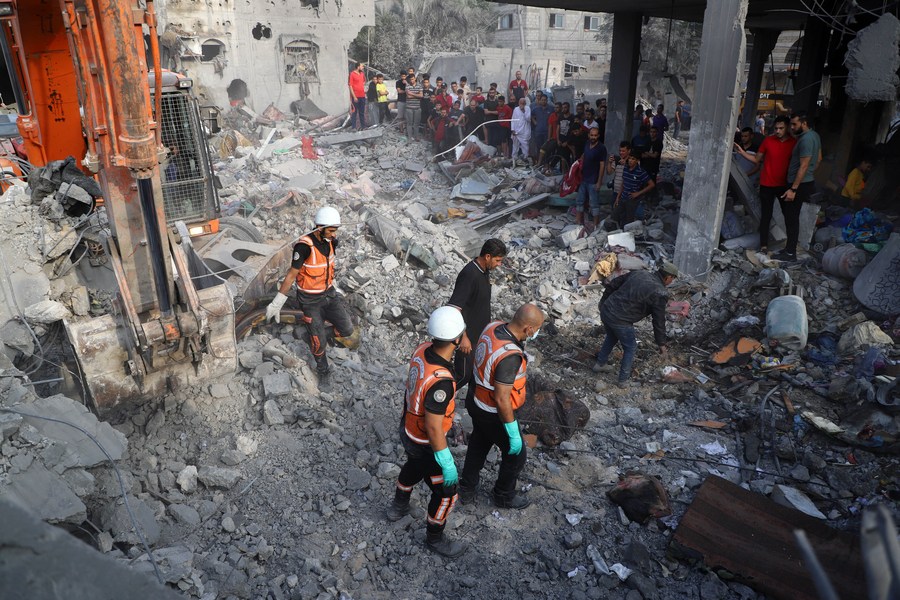
In their latest demand for an immediate and sustainable cease-fire in the Israel-Palestine conflict, Arab leaders have been playing a crucial role in the region by balancing their economic diversification ambitions and containing tensions from breaking into a war, analysts said.
On Oct 25, nineteen days into the flare-up between Hamas and Israel on Oct 7, Egypt, Jordan, the United Arab Emirates, Bahrain, Saudi Arabia, Oman, Qatar, Kuwait and Morocco, have called on the United Nations Security Council, to obligate the warring parties in the Gaza Strip to an immediate and sustainable cease-fire, and restraint.
The call came in a joint press statement by the foreign ministers, according to Xinhua News Agency. The Arab foreign ministers also underscored the importance of immediately releasing hostages, emphasizing the role of the International Committee of the Red Cross.
Since Oct 7, Arab leaders have held inter-regional meetings, including meetings with other international leaders and humanitarian organizations, resulting in the release of some hostages held by Hamas under humanitarian grounds – the latest on Oct 23 was largely credited to Qatari-Egyptian mediation.
Dire life-saving aid finally started to roll into Gaza through the Rafah border which the Palestinian enclave shares with Egypt on Oct 21.
Also, widely reported was that Saudi Arabia had paused its normalization talks with Israel while the United Arab Emirates, which made a deal with Israel through the Abraham accords in 2020, had earlier condemned the loss of civilian lives from both the Israel and Palestine sides.
"It is important to acknowledge the immense pressure faced by Arab leaders from both domestic and international stakeholders. Arab states are often placed in a tight spot, as they must navigate their own interests while simultaneously addressing the concerns of their citizens who are deeply invested in the Palestinian cause," Nagapushpa Devendra, a West Asia analyst and research scholar at the University of Erfurt in Germany, told China Daily.
Rasha Al Joundy, senior researcher at the Dubai Public Policy Research Centre in the United Arab Emirates, said that the countries in the region are concerned that a vicious military escalation could spread to neighboring countries and have an impact on the livelihood and economic diversification plans "because it would transform the conflict into a war, and presume the region high risk for foreign investment".
"Most importantly, a major escalation could have a long-lasting political not just military impact on the Palestinian cause, which the Arab leaders want to avert, such as ethnic massacres, or forcibly relocating the Palestinians towards Egypt, giving a scene worse than 1948. I believe this is the core of diplomatic efforts nowadays in the region," Al Joundy told China Daily.
At the Cairo Summit for Peace on Oct 21, which was called for by Egyptian President Abdel-Fattah al-Sisi, some 30 Arab and Western leaders, called for a ceasefire. They also pushed for a two-state solution.
The meeting was held just days after Jordan cancelled a summit it was scheduled to host in Amman on Oct 17 with United States President Joe Biden.
Jordan's Foreign Minister Ayman Safadi has said that the meeting would be held at a time when the parties could agree to end the "war and the massacres against Palestinians", blaming Israel with its military campaign for pushing the region to "the brink of the abyss", according to a report by Al Jazeera.
Anis Khayati, an economics professor at the College of Business Administration at the University of Bahrain, thinks Israel wants to exploit the opportunity to achieve new goals.
"In light of the prolongation of the crisis, the new normalizers with Israel find themselves in an extremely awkward position, in light of their failure to find a justification for their rapprochement with Israel in front of the public opinion in their countries," said Khayati.
jan@chinadailyapac.com

GAZA - The death toll of Palestinians from Israeli military strikes on the Gaza Strip has risen to 7,028, the Hamas-run Health Ministry said on Thursday.
So far, 18,484 Palestinians have been injured since the fighting broke out, the ministry said in a statement.
Israel has launched massive airstrikes and limited ground operations against Gaza in retaliation for a surprise attack by Gaza-ruling Hamas militants on Israeli military targets and towns on Oct 7, which has killed at least 1,400 people in Israel.

GAZA/JERUSALEM - As the Israel-Hamas conflict entered the 20th day, Israeli tanks and infantry raided the northern Gaza Strip, while the death toll of Palestinians increased to 7,028. Nine Arab countries urged the UN Security Council (UNSC) to oblige the warring parties to an immediate and sustainable cease-fire.
On the night between Wednesday and Thursday, Israeli tanks and infantry raided the northern Gaza Strip. The military said the raid was "part of preparations for the next stages of combat," in which Israel plans a ground offensive in Gaza.
In the morning, Israel Defense Forces Spokesman Daniel Hagari told reporters that warplanes struck over 250 Hamas targets in Gaza, including infrastructure, operational command centers, tunnel shafts, and rocket launchers. Naval soldiers struck a Hamas surface-to-air missile launch post in the Khan Yunis area.
The Hamas-run Health Ministry updated the death toll to 7,028, while 18,484 Palestinians have been injured, refuting the US skepticism. US President Joe Biden said on Wednesday that he "does not trust the validity of the death toll announced by the Palestinians in the Gaza Strip".
In a press conference, Ashraf al-Qedra, spokesperson of the ministry, read a 212-page report of the names and numbers of those killed in Gaza, and said "the Israeli occupation killed at least 7,028 Palestinians, including 2,913 children, 1,709 women and 397 elderly people".

"The world must realize that behind every number is the story of a person whose name and identity are known. Our people are not nobodies who can be ignored," he stressed.
Also on the day, the United Nations Economic and Social Commission for Western Asia (ESCWA) said in a press release that about 96 percent of Gazans have been plunged into poverty due to the ongoing conflict between Israel and Gaza-ruling Hamas.
"Even if a cease-fire is agreed and humanitarian aid is allowed to enter Gaza, poverty and deprivation will affect a significant share of the population for years to come," the release added.
Following the UN's failure to adopt two draft resolutions regarding Israel and Palestine, foreign ministers of nine Arab countries, namely Egypt, Jordan, the United Arab Emirates, Bahrain, Saudi Arabia, Oman, Qatar, Kuwait, and Morocco, urged the UNSC to oblige the warring parties in the Gaza Strip to an immediate and sustainable cease-fire.
In a joint statement, they condemned and rejected attempts at individual or collective forced displacement, as well as the policy of collective punishment.
They also expressed deep concern about the possibility of the current confrontations and conflict to expand to other regions in the Middle East, calling on all parties to exercise the utmost restraint.
On Thursday, rocket fire from Gaza continued, sending millions to shelters in Tel Aviv, Israel's financial capital, and other cities in central and southern Israel. About 1,400 people were killed and 224 kidnapped, according to official Israeli figures.
Israel's Shin Bet internal security confirmed in a statement that the deputy head of Hamas' Intelligence Directorate Shadi Barud was killed in an airstrike carried out based on "precise intelligence".
In his previous role as the head of the Fire Control Center in Hamas' Operations Unit, Barud planned the Oct 7 attack together with Yahya Sinwar, Hamas leader in the Gaza Strip, according to the statement.

UNITED NATIONS - The UN General Assembly on Thursday resumed its 10th Emergency Special Session on the Israeli-Palestinian conflict.
General Assembly President Dennis Francis, in his opening remarks, condemned both the Hamas attack on Israel on Oct 7 and Israel's indiscriminate targeting of civilians and the destruction of critical infrastructure in Gaza.
"The brutality of the Hamas assaults is shocking and unacceptable, and has no place ... in our world," he said. "The ceaseless bombardment of the Gaza Strip by Israel and its consequences are deeply alarming. The right of self-defense does not and cannot lawfully give license to undertake indiscriminate and disproportionate reprisal."
Francis said all parties to this conflict must abide by international humanitarian law and immediately create the necessary conditions to allow for an opening of a humanitarian corridor to the Gaza Strip.
"We must ensure that urgently needed life-saving assistance reaches those in need - from the delivery of basic foodstuff to the safe passage of humanitarian and medical staff. Any action to the contrary - to deprive the people of Gaza of unimpeded access to essential livelihood supplies - would be a clear violation of their human rights and an affront to international humanitarian law," he said.
"We, the United Nations, cannot allow the fundamental principles of human rights and of international law to be compromised. As the United Nations, we are obliged to uphold them - without any conditions, or reservations, and certainly without any exceptions," Francis noted.
At this juncture, the most immediate step is clear: "the violence must cease, and further bloodshed must be prevented," he said, calling for the prompt and unconditional release of all hostages; an immediate, unconditional humanitarian cease-fire; and an immediate, unconditional opening of corridors of humanitarian assistance and relief.
The only path to a comprehensive, just, and lasting peace is a negotiated two-state solution, consistent with international law, the UN Charter, and relevant UN resolutions - a solution that fulfills Israel's legitimate needs for security and that fulfills the state of Palestine's legitimate aspirations for an independent state, said Francis.
He urged all parties to set aside their animosities and focus instead on averting war by prioritizing saving lives.
"I urge the (UN) membership to use today's session not to further fan the flames of hate, division and revenge. Let us seize the opportunity, instead, to unify our purpose and our actions to save lives and to end violence."
The resumed Emergency Special Session is expected to run into Friday and a resolution tabled by Jordan is expected to be voted on.
The UN Security Council, which holds the primary responsibility for international peace and security, has failed to adopt any resolution on the latest escalation in the past two weeks.
In an emotional speech, Palestine's UN ambassador Riyad Mansour said Israel's war on Gaza is not defendable.
Some 7,000 Palestinians have been killed since Oct 7, 70 percent of them were women and children. Almost all of the killed were civilians, he said.
"Is this the war some of you are defending? Can this war be defended," he asked Western delegations. "These are crimes. This is barbarianism."
Mansour called on delegations to vote in favor of the Jordanian-drafted resolution.
"Vote to stop the killing. Vote for humanitarian aid to reach those whose very survival depends on it. Vote to stop this madness," he said. "Choose justice, not vengeance. Choose peace, not more wars. Vote to put an end to two, almost three weeks of the worst double standards we have seen in decades, to restore some credibility of this place and the rules it is supposed to embody."
"Lives are hanging in the balance. And every life is sacred. Please save lives, save lives, save lives," said the ambassador.
Jordanian Deputy Prime Minister and Foreign Minister Ayman Safadi, who spoke on behalf of the Arab Group, said the draft resolution his country is putting forward seeks what the United Nations was established to achieve: peace and compliance with international law.
"Let's make a collective cry. Cry out against more bloodletting. Let's unite for peace. Let's unite for justice. Let's unite for the right of every Palestinian and every Israeli child to live free from the horrors of war, free from fear, looking for a life full of promise and full of opportunity," he said.
"For the sake of Palestinian people and for the sake of Israeli people, vote YES," said Safadi. "Let the passing of the draft resolution be a message to Palestinians, suffering from the inferno of this Israeli war on them. Let it be a message that the international community sees them, feels their pain, and believes that Palestinian lives matter too."

JERUSALEM -- Israeli tanks and infantry raided the northern Gaza Strip in a predawn attack Thursday, the Israel Defense Forces (IDF) said in a statement.
The military said that forces conducted "a targeted raid" using tanks in the northern Gaza Strip. According to the statement, the raid was "part of preparations for the next stages of combat," in which Israel plans a ground offensive in Gaza.
During the raid, soldiers located and struck "numerous" militants, infrastructure and anti-tank missile launch posts and "operated to prepare the battlefield," IDF said.
According to a statement, the soldiers have since exited the area and returned to Israeli territory.
There were no reports of casualties on the Israeli side, and the soldiers exited the area at the end of the incursion.
At least 6,546 people have been killed in Gaza since Israel launched its war on Hamas on Oct. 7 following Hamas' onslaught on communities in southern Israel earlier that day.
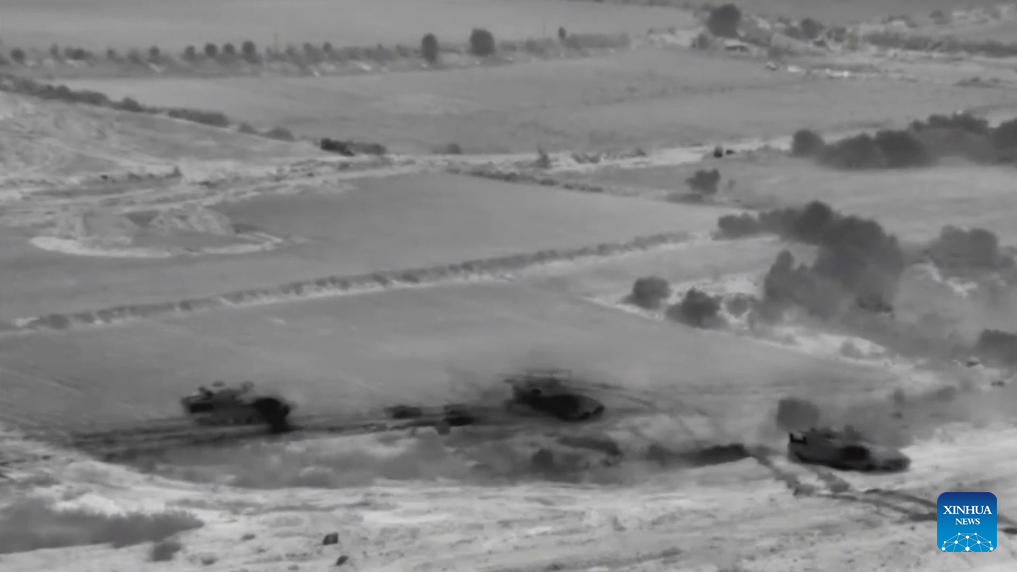


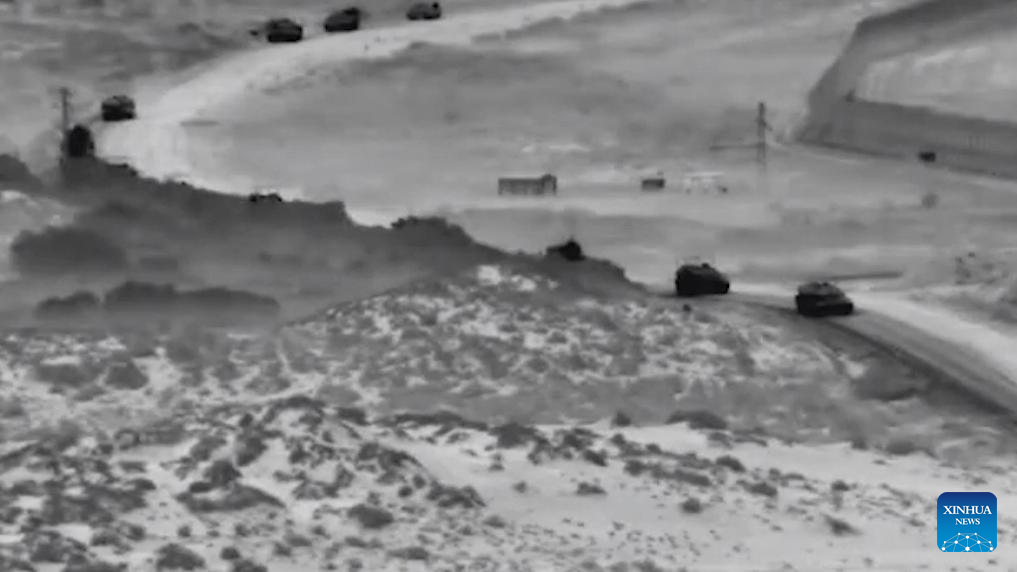
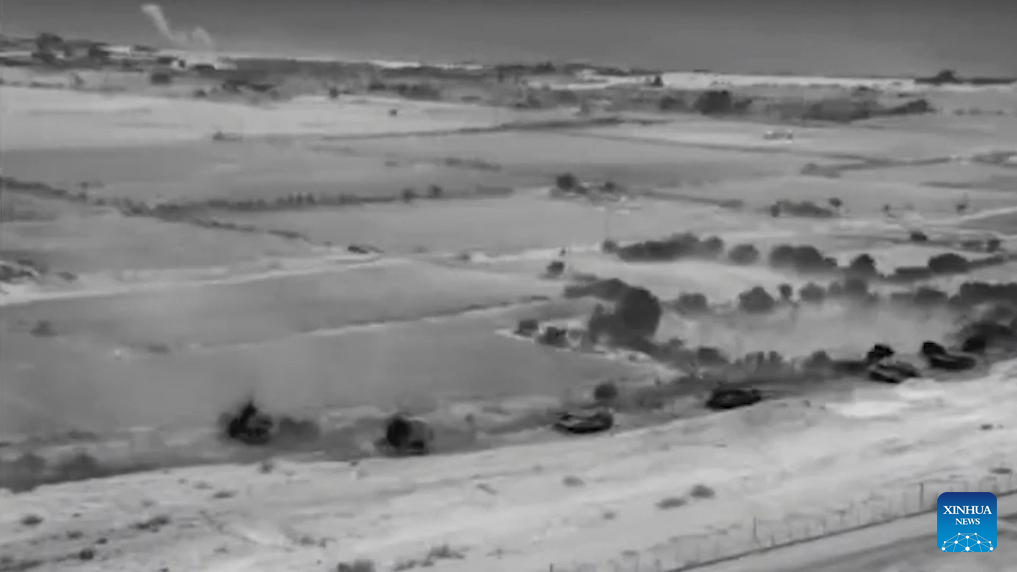
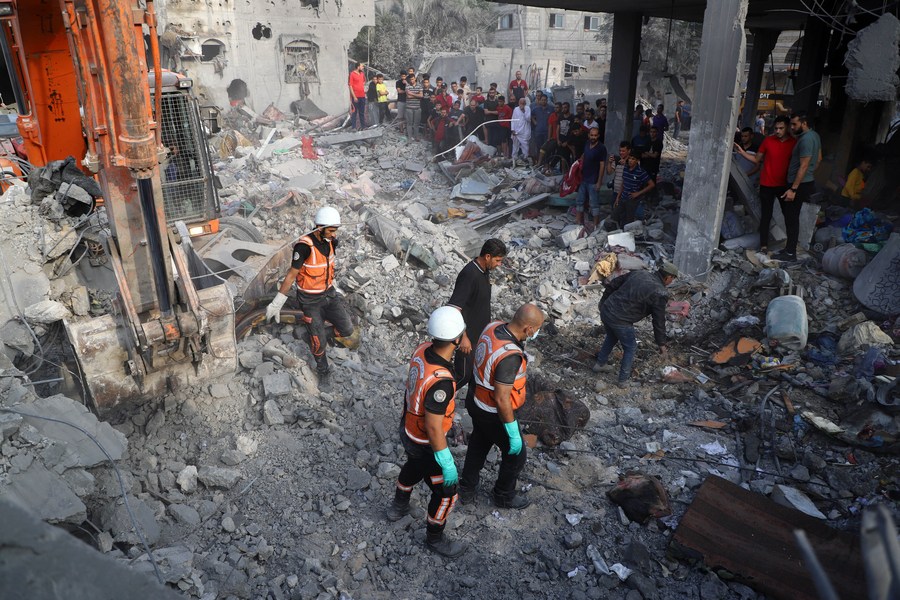
China on Wednesday voted against a United Nations Security Council resolution on the Palestinian-Israeli conflict, saying that it was "introduced in haste" and does not address the crucial issue of a cease-fire.
The draft resolution "does not reflect the world's strongest calls for a cease-fire and an end to the fighting", said Zhang Jun, China's permanent representative to the UN.
The latest resolution drafted by the United States condemned Hamas, expressed support for Israel and called for the release of all hostages.
Russia and the United Arab Emirates also voted against the resolution.
Zhang said: "China is by no means opposing the council taking actions. On the contrary, we have always strongly called for the council to play a responsible role.
"What we oppose is that the draft resolution is evasive on the most urgent issue of ending the hostility. It has never been able to call for an immediate cease-fire in clear and unambiguous terms," he said.
"At this moment, cease-fire is not just a diplomatic term; it means the life and death of many civilians. If a council resolution is ambiguous on the question of war and peace and of life and death, it is not only irresponsible, but also extremely dangerous," Zhang said.
"It is tantamount to paving the way for large-scale military actions and giving the green light to further escalation of war," he said.
The ambassador mentioned that on Oct 18, a draft resolution focusing on the humanitarian situation of the conflict and emphasizing the protection of civilians, which was supported by an overwhelming majority of council members, was vetoed by the US. A draft resolution proposed by Russia on Oct 16 also was vetoed.
On Saturday evening, the US introduced the new draft resolution "that set aside the consensus of the members, included many elements that were still deeply divisive, and went far beyond the humanitarian realm", Zhang said.
Several Security Council members, including China, Russia, the UAE and Brazil proposed amendments to the text.
"However, the sponsor, ignoring the major concerns of relevant members, made only cosmetic changes to the draft" before the text was rushed to a vote, Zhang said.
"China is by no means indifferent to acts that harm civilians. On the contrary, we strongly condemned at the first opportunity all violence and attacks against civilians and called for diplomatic efforts to promote the early release of hostages," he said.
"What we oppose is that the draft resolution does not call on the parties concerned to stop the indiscriminate and asymmetrical use of force, nor does it call for a thorough investigation into the heinous attacks such as the one on the Al-Ahli Hospital," he said. "Such selective application of international law and double standards will only push more innocent civilians to the brink of death."
Zhang said that the draft resolution "selectively avoids referring to the root causes of the current humanitarian crisis in Gaza and fails to urge Israel to lift its full siege on Gaza and to rescind the evacuation order for northern Gaza".
"Such an evasive and ineffectual approach will only accelerate Gaza's falling into an even greater humanitarian catastrophe," he said.
"China is by no means denying Israel's security concerns. On the contrary, we have always strongly advocated that equal attention should be paid to the security concerns and legitimate rights of both Israel and Palestine," Zhang said.
"What we oppose is that the draft resolution attempts to establish a new narrative on the Palestinian question, ignoring the fact that the Palestinian territory has been occupied for a long time, and evading the fundamental issue of independent statehood for the Palestinian people," he said.
Zhang said that the draft "departs from the spirit of previous UN resolutions and embeds the dangerous logic of clash of civilizations and the justification of war and use of force".
"If adopted, it will completely dash the prospect of the two-state solution and plunge the Palestinian and Israeli peoples into a vicious cycle of hatred and confrontation," he said.
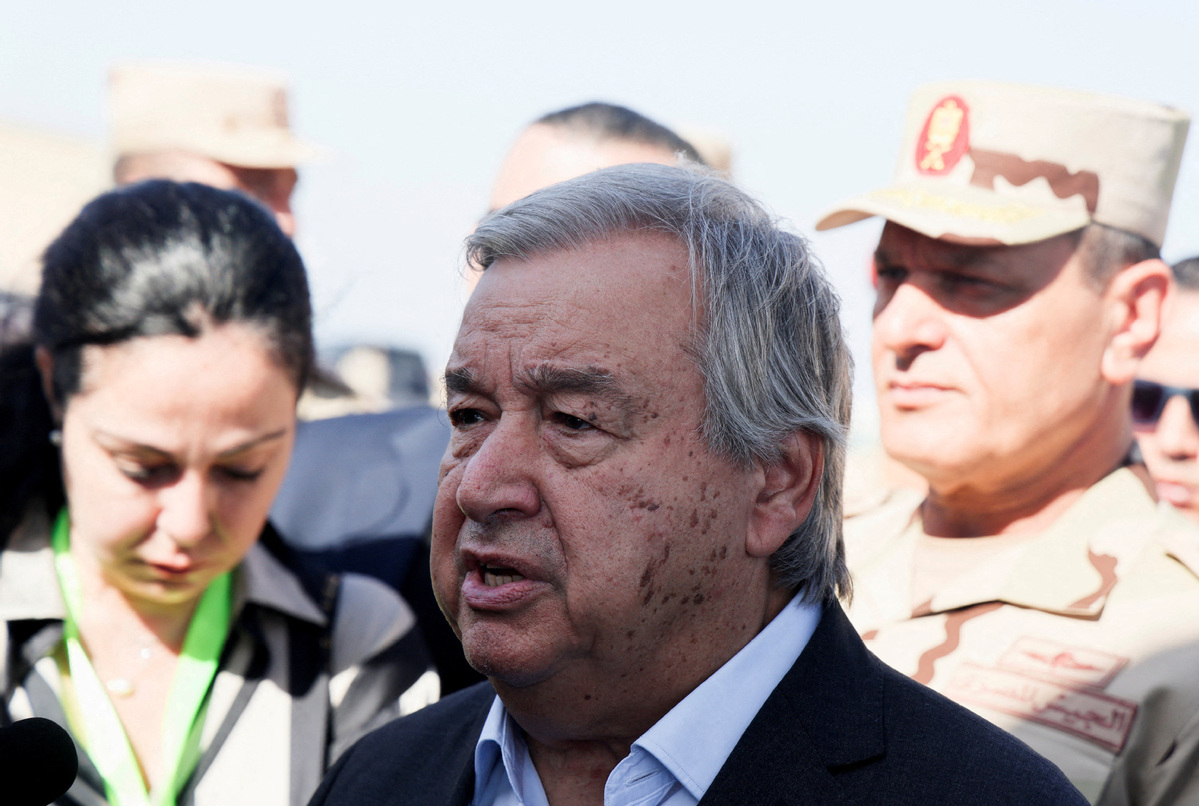
UNITED NATIONS - UN Secretary-General Antonio Guterres on Wednesday strongly refuted the "false" assertion made by senior Israeli diplomats, who accused him of endorsing the Oct 7 Hamas attacks in a statement he presented to the Security Council.
Addressing Tuesday's debate at the Security Council on the worsening crisis in Israel and Palestine, the UN chief said that although nothing could justify the "appalling" attacks by Hamas on Oct 7 which triggered the siege and bombardment of Gaza, it is important to recognize they "did not happen in a vacuum" and did not justify the collective punishment of Palestinians.
Following Guterres' briefing on Tuesday, Israel's permanent representative to the UN Gilad Erdan tweeted that Guterres' speech had sought "to justify Hamas's brutal assault" which left some 1,400 dead, mainly civilians.
Erdan demanded that the UN chief resign, and later said that Israel would withhold visas from UN officials.
Israel's Foreign Minister Eli Cohen also leveled accusations at Guterres for endorsing terrorism and subsequently called off a scheduled bilateral meeting with the UN chief on Tuesday.
Later on Tuesday the UN chief met some of the families of those taken hostage by Hamas fighters, and reaffirmed his call for the immediate and unconditional release of all those being held in violation of international law inside Gaza.
In a statement to correspondents at the stakeout outside the Security Council on Wednesday morning, Guterres said he was "shocked by the misrepresentation by some of my statement".
Acknowledging that he had indeed spoken of Palestinian grievances, he stressed he had also said in the council that "the grievances of the Palestinian people cannot justify the appalling attacks by Hamas".
Without referring to Israeli diplomats specifically, the UN chief said it is "necessary to set the record straight - especially out of respect to the victims and to their families".

GAZA/BEIRUT - The death toll of Palestinians from Israeli airstrikes on the Gaza Strip has risen to 6,546, said the Hamas-run Health Ministry in Gaza Strip on Wednesday. Meanwhile, 17,439 Palestinians were wounded in the coastal enclave, the ministry said in a statement.
Over the past two days, Israel has intensified airstrikes and artillery shelling against the Gaza Strip, said Palestinian security sources and local eyewitnesses. The United Nations Office for the Coordination of Humanitarian Affairs said in a statement on Wednesday Israel's aerial bombardment and artillery shellings have increased three-fold compared to previous days.
The Israel Defense Forces (IDF) said Wednesday that it identified at least two Hamas "terrorists" that attempted to infiltrate Israeli territory in the area of Zikim via the sea, after Hamas armed wing Al-Qassam Brigades said its fighters had infiltrated Israel's Zikim base in Ashkelon and clashed with its forces.
On Wednesday morning, the IDF said on social media platform X that its extensive attacks on Gaza during the past day had eliminated Hamas operatives and infrastructure, including tunnel shafts, military headquarters, munitions warehouses and mortar bomb and anti-tank missile launchers.
The Israeli airstrikes and punitive measures, including a siege on the enclave with supplies of water, electricity, fuel, and other necessities being cut off, were triggered by a large-scale Hamas attack on Israeli military targets and towns on Oct 7, which has so far killed at least 1,400 people in Israel.
On Wednesday, 10 Palestinians were killed in an aircraft bombardment on "the only bakery" in the al-Mughazi refugee camp in central Gaza, which also destroyed several surrounding houses, said Salama Maarouf, head of the Hamas-run government media office in Gaza.
The United Nations Relief and Works Agency for Palestine Refugees, said only four of the 24 bakeries it contracted still supply bread for shelters, warning that most of the remaining ones might close soon due to fuel shortages.
Hamas media office said that Israel had bombed Gaza with more than 12,000 tons of explosives, equals to dropping 33 tons per square km, leading to the damages of more than 183,000 housing units, or 50 percent of all housing in Gaza.
Salama Maarouf said during a press conference that one person out of every 100 citizens in the Palestinian enclave was either killed or injured in Israel's continuous attacks, and about 1,400,000 people, or 70 percent of Gaza's population, have been internally displaced, many of whom seek refuge in 222 shelter centers.
Also on Tuesday, a Palestinian spokesman warned of a "total collapse" of the health system in Gaza due to power outage and the exhaustion of fuel needed to operate generators in hospitals.
Ashraf Al-Qudra, spokesman for the Gaza-based Health Ministry, told a press conference that Israeli attacks had so far killed 65 medical staff, destroyed 25 ambulances, and made 12 hospitals and 32 health centers in the Palestinian enclave inoperable.
Al-Qudra said Gaza faces a possible outbreak of infections, as 3,150 cases of diseases, ranging from diarrhea, food poisoning, scabies and bronchial infections were reported in a day since the ongoing conflict, with most of them reported among children, due to the lack of clean water and poor sanitation in shelter facilities.
At the same time, the Israeli army continued to threaten a ground invasion into Gaza, raising fears of prolonging the round of fighting and the possibility of expanding the escalation into a regional war.
IDF Chief-of-Staff Herzi Halevi said Tuesday the troops are honing tactical preparedness while awaiting a joint decision from "the political level regarding the essence and timing of the next stage".
Speaking to a Security Council open debate on the ongoing conflict between Israel and Palestine on Tuesday, UN Secretary-General Antonio Guterres stressed that the protection of civilians holds paramount importance in any armed conflicts, urging relevant parties to refrain from "using them as human shields" or ordering millions "to evacuate to the south, where there is no shelter, no food, no water, no medicine and no fuel, and then continuing to bomb the south itself".
Guterres voiced deep concern over "the clear violations of international humanitarian law that we are witnessing in Gaza", repeating his call for an immediate humanitarian ceasefire.
Tensions are also growing along the Israeli-Lebanese border and in Syria. In southern Lebanon, three Hezbollah fighters were killed on Wednesday evening by the Israeli army on the border, raising the total number of Hezbollah deaths to 44 since the fighting broke out, the Lebanese Shiite military group said in a statement.
Hezbollah said it had attacked the Israeli "Branit" barracks with missiles and artillery shells, and a military target near the Hadab Al-Bustan site in the western sector of the border with occupied Palestine and two Israeli sites of Hanita and Al-Bahri with guided missiles, destroying their equipment.
In Syria, the Aleppo International Airport in the north was damaged in an Israeli missile attack on Wednesday, hours after another missile launched from the Israeli-annexed Golan Heights killed eight Syrian military personnel in the southern province of Daraa, the Syrian army said.
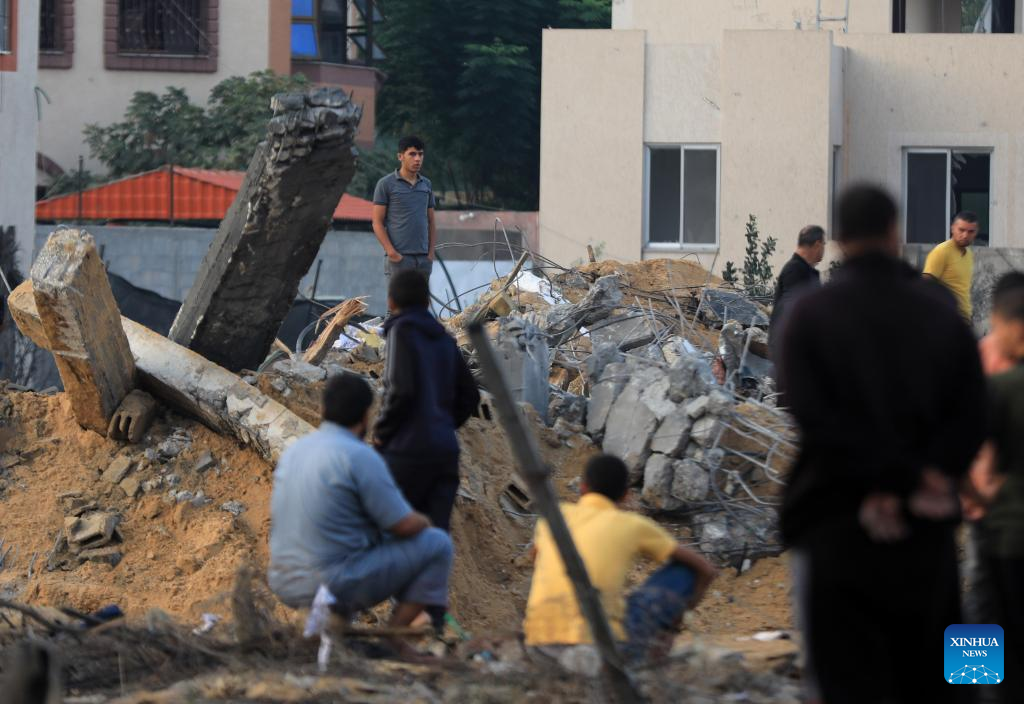
UNITED NATIONS -- The UN Office for the Coordination of Humanitarian Affairs (OCHA) said Wednesday that the humanitarian crisis in Gaza has reached an unprecedented point.
The UN Agency for Palestine Refugees, or UNRWA, which is by far the largest humanitarian provider in Gaza, warned that the agency will be forced to halt all operations by Wednesday night unless fuel is allowed into Gaza immediately.
Hospitals are shutting down as they lack fuel, water, medical supplies and personnel. Fuel is being severely rationed for a select number of critical facilities. The backup generators are not designed for continuous operation and could break, said OCHA.
UN personnel visited hospitals on Tuesday. In one hospital, they noted hundreds of wounded men, women and children. Many of them were unconscious, with open wounds - lying on beds, stretchers and on the floor - with limited medical attendance. In the yard, there was a tent with tens of dead bodies, including children. Many of the dead are kept there because the morgues are full, it said.
Food stocks are running out. The World Food Programme estimates that current supplies of essential food in Gaza are sufficient for about 12 days. However, at shops, the available stock is expected to last for only five days, said OCHA.
People are resorting to drinking well water, which is extremely high in salt and poses immediate health risks. Health partners have also detected cases of chickenpox, scabies and diarrhea due to poor sanitation conditions and consumption of water from unsafe sources, it said.
The number of internally displaced people is now estimated at more than 1.4 million, including nearly 590,000 people sheltering in UNRWA-designated shelters. More than 15 percent of the displaced are estimated to have disabilities, yet most shelters are not adequately equipped for their needs, it said.
Local authorities report that more than 40 percent of all housing units in the Gaza Strip have been destroyed or damaged, said OCHA.

RAMALLAH -- At least three Palestinians were killed and more than 20 others injured when an Israeli reconnaissance plane bombed the Jenin refugee camp in the West Bank, Palestinian security and medical sources said on Wednesday.
"The bodies of three young men, together with 20 injuries, some in critical conditions, were transferred to the Jenin hospital as a result of an attack by an Israeli reconnaissance plane," Wissam Bakr, director of Jenin Governmental Hospital, told Xinhua.
Palestinian witnesses said that a large number of Israeli forces stormed the city of Jenin, the surroundings of the camp, and the town of Burqin, amid armed clashes with Palestinian militants.
According to locals, a huge explosion was heard resulting from the launch of a missile from an Israeli reconnaissance plane, near the camp cemetery, which led to a number of young men being killed or wounded.
Armed Palestinian factions said that their members clashed with Israeli forces and targeted them with gunfire and homemade explosive devices.
The Israeli military said in a statement that the drone strike was carried out after "armed terrorists" fired and threw explosives at Israeli forces operating in the Jenin refugee camp. No Israeli personnel were injured in the clashes.
GAZA -- The Hamas-run Health Ministry on Tuesday warned of the possible outbreak of a major epidemic wave in the Gaza Strip, amid the ongoing Israeli airstrikes and siege on the Palestinian enclave.
Ministry spokesperson Ashraf al-Qedra said in a press statement that up to 3,150 cases of diseases were recorded in a single day after the outbreak of Israel-Hamas conflict on Oct. 7, with the most of them reported among children. The diseases included diarrhea, food poisoning, skin symptoms, scabies, and bronchial infections.
Due to overcrowding in shelter facilities, a lack of clean water, and poor personal hygiene, epidemic diseases have become increasingly prevalent, he said.
To prevent the spread of diseases, he called on the international community to provide immediate assistance and restore basic services in Gaza, including water, electricity, and sanitation.
Hamas militants launched a surprise attack on Israel on Oct 7, firing thousands of rockets and infiltrating Israeli territory, where they seized a large number of hostages. To respond, Israel launched massive airstrikes and punitive measures, including a siege on the enclave with supplies of water, electricity, fuel, and other necessities being cut off.
The ongoing Israel-Hamas conflict has so far killed nearly 5,800 Palestinians in the Gaza Strip and more than 1,400 people in Israel.

GAZA/JERUSALEM -- The Palestinian Islamic Resistance Movement (Hamas) released two elderly Israeli women held hostage in Gaza on Monday, as more planes carrying humanitarian aid landed at Egypt's al-Arish Airport in North Sinai, waiting to be sent into war-torn Gaza.
As Israel's airstrikes on Gaza and its preparations for a possible ground invasion of the Palestinian enclave persisted, Lebanon's Shiite military group Hezbollah and Israel clashed more along the border, raising fears of a regional escalation of the conflict.
HAMAS RELEASES HOSTAGES
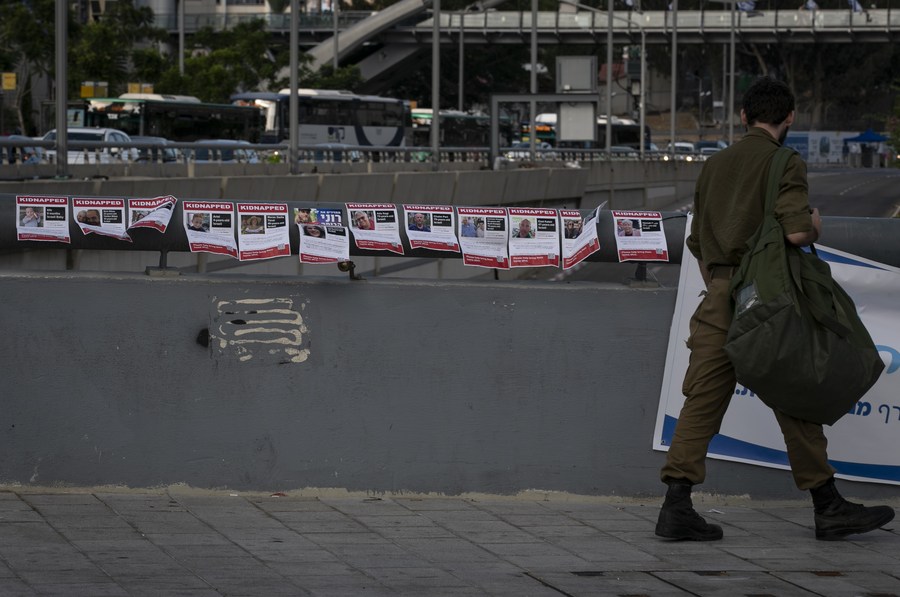
Al-Qassam Brigades, the military wing of Hamas, said Monday in a statement that it has freed two more hostages for "humanitarian reasons" through "Egyptian-Qatari mediation."
It is the second time that Hamas has released some of the hostages it took on Oct. 7 after releasing two American hostages on Friday.
An Israeli government official confirmed the release of the two Israelis, who arrived at the Rafah crossing between Gaza and Egypt, adding that an Israeli team was on its way to meet them.
Israel's state-owned Kan TV news identified the two women as Yocheved Lifshitz, 85, and Nurit Cooper, 79. Yocheved's husband, Oded Lifshitz, an 83-year-old journalist, was kidnapped with his wife and is still being held by Hamas.
Earlier on Monday, Palestinian sources said Hamas plans to release some foreign hostages captured in Gaza following "intense mediation efforts made by Qatar, Egypt and the United Nations."
In a briefing to reporters, Israel Defense Forces (IDF) Spokesman Daniel Hagari said the military "has been actively involved in operational and intelligence efforts to secure the release of all the hostages," while neither confirming nor denying reports on Hamas' hostage-release plan.
Hagari confirmed that the number of hostages in Gaza now stands at 222, adding they include Israelis, foreign nationals, women, children, and the elderly.
MORE HUMANITARIAN AID ENTERS GAZA

The latest release of two Israelis also coincided with the delivery of the third shipment of humanitarian aid into the coastal enclave through the Rafah crossing on Monday.
The Palestinian Red Crescent confirmed that it has received the third convoy of 20 trucks carrying humanitarian aid containing food, water, medicines, and medical supplies.
Meanwhile, planes from Algeria, Kuwait, Iraq, Türkiye, the United Arab Emirates, and the World Health Organization carrying humanitarian aid for the Gaza Strip arrived at Egypt's al-Arish Airport, which is less than 50 km from the Rafah crossing.
Turkish Health Minister Fahrettin Koca said on Monday that Türkiye sent two cargo planes to Egypt carrying medical equipment and supplies for the Gaza Strip, adding that two more aircraft would be sent with more supplies. The aircraft also carried a medical team of 20 doctors, he said on social media platform X.
ISRAEL CONTINUES AIRSTRIKES, PREPARES GROUND OFFENSIVE

Meanwhile, Israel continued its bombardment of Gaza with hundreds of air attacks on the besieged coastal enclave. According to the Gaza-based Palestinian Health Ministry, at least 436 Palestinians were killed in the last 24 hours, pushing the total death toll in Gaza to at least 5,087, which includes around 2,055 children.
Having entered its 17th day, the conflict has also killed over 1,400 people in Israel, according to official statistics.
The Israeli military reported the killing of five commanders from Hamas' aerial array, responsible for Gaza's air defense, in addition to "dozens" of Palestinian militants.
As the airstrikes intensified, the Israeli army prepared for a potential ground offensive, deploying tens of thousands of troops and conducting training exercises.
The IDF also carried out limited ground raids in Gaza. "During the night, there were raids by tank and infantry forces," Hagari told reporters during a daily briefing on Monday, saying that the raids were carried out "deep" in Gaza.
The raids and air strikes "have been carried out as part of the preparations for the next stage of the war," Hagari added.
On Sunday, Hamas said it destroyed an Israeli tank and two armored bulldozers and forced an Israeli force infiltrating east of Khan Younis in south Gaza to withdraw. The Israeli military also confirmed that a soldier was killed and three others were wounded by an anti-tank missile during a raid inside Gaza.
Meanwhile, more rockets were still launched from Gaza towards southern Israel, hitting an apartment in the southern Israeli city of Sderot. No injuries were reported, as most residents in the city had already been evacuated to central Israel.
ISRAEL-LEBANON BORDER CLASH ESCALATES
Fighting also continued along Israel's northern border with Lebanon. Israel's Magen David Adom rescue service reported that a ten-year-old girl and a 39-year-old man sustained minor injuries on Monday when an anti-tank missile struck the backyard of a house in Kiryat Shmona, a northern city that Israel had commenced evacuating on Friday.
The Israeli military responded by launching drone and artillery attacks on two groups of fighters who were attempting to fire anti-tank missiles from Lebanon into Israeli territory.
Lebanese army sources said a Hezbollah fighter was killed during clashes with the Israeli army on the border. This incident brought the total number of Hezbollah fighters killed within a 24-hour period to five, with four others wounded.
Hamas launched a surprise attack on Israel on Oct. 7, firing thousands of rockets and sending its militants into Israeli territory, to which Israel responded with massive airstrikes and punitive measures, including a siege on the enclave with supplies of water, electricity, fuel, and other necessities being cut off.
On Oct. 8, Hezbollah fired multiple rockets toward Israeli military sites in support of Hamas, prompting heavy artillery from the Israeli side. Since then, the Israel-Lebanon border has seen escalating tensions, increasing the odds of a broader war in the region.
BEIJING -- On the current Palestinian-Israeli conflict, it is imperative to prevent the situation from escalating further and causing even more serious humanitarian hardship, said Chinese Foreign Minister Wang Yi on Monday.
The current Palestinian-Israeli conflict affects the whole world and involves a major choice between war and peace, Wang, also member of the Political Bureau of the Communist Party of China Central Committee, said in a phone conversation with Israel's Foreign Minister Eli Cohen.
Cohen introduced Israel's position and security concerns on the Palestinian-Israeli conflict.
China is deeply concerned about the continued escalation of the conflict and the worsening situation, and deeply saddened by the large number of civilian casualties caused by the conflict, Wang said.
China condemns all acts that harm civilians and oppose any violation of the international law, said Wang.
All countries have the right to self-defence, but they should respect the international humanitarian law and protect the safety of civilians, he added.
Wang stressed that the painful lesson of the repeated cycle of Palestinian-Israeli conflict fully demonstrates: only adhering to the concept of common security can help achieve sustainable security, and only adhering to the direction of political settlement can facilitate the thorough resolution of Israel's legitimate security concerns.
The two-state solution is the consensus of the international community, Wang said.
It is hoped that the two sides can consider the current situation as well as the long-term interests of peace and security shared by future generations, return to the right track of the two-state solution as soon as possible, resume peace talks and realize the peaceful coexistence of Palestine and Israel and the harmonious coexistence of the Arab and Jewish nations, he said.
Wang said China does not pursue any selfish interests on the Palestinian issue and sincerely hopes that the issue can be comprehensively and fairly resolved on the basis of the two-state solution, so that the legitimate security concerns of all parties can be truly and thoroughly addressed.
China will firmly support anything that is conducive to peace and will do its best as long as it is conducive to the reconciliation between Palestine and Israel, he said.
Wang also said he hopes that the Israeli side would take effective measures to protect the safety of Chinese citizens and institutions in Israel.
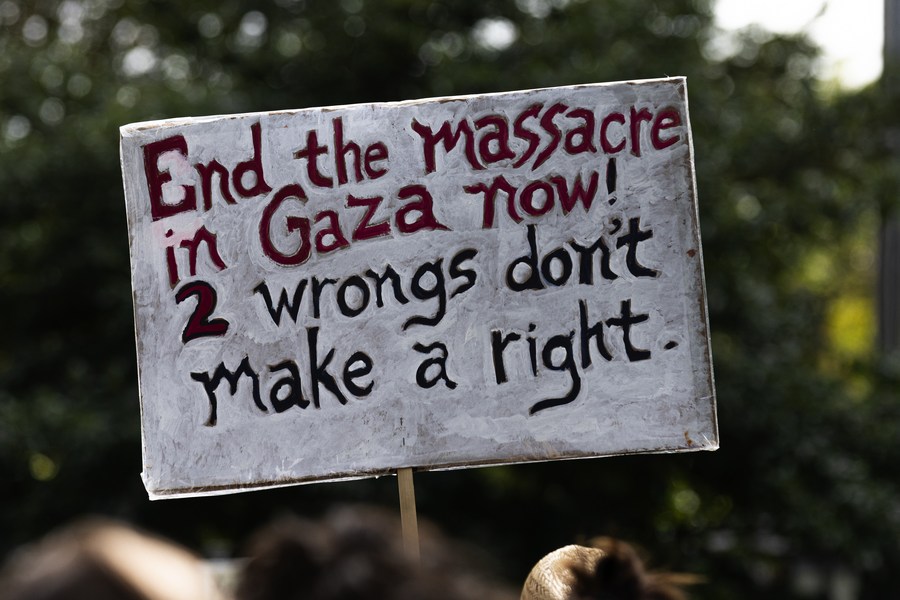
CAIRO -- Amid the escalating Israel-Hamas conflict and growing global calls for de-escalation and increased humanitarian aid for Gaza, US President Biden's request to Congress for $14.3 billion in military assistance to Israel has raised concerns.
Biden argued on Friday that this move would enhance Israel's security. However, analysts and critics worry that it could increase uncertainty in the Middle East, potentially harming Israeli security that Biden claimed to protect.
Washington's foreign policy on the Palestinian issue has impeded the early resolution of the conflict, according to Middle Eastern political watchers, who warned that allowing the current hostilities in Gaza to persist will only intensify the vicious cycle of hatred and confrontation between Israel and Palestine, making it more difficult to achieve peaceful coexistence in the long run.
DOMESTIC, INT'L BACKLASH
More than two weeks into the deadly conflict, the United States has not only bolstered its military presence in the Middle East but has also provided extensive military aid to Israel. Additionally, it has twice used veto power at the United Nations Security Council to block resolutions concerning the situation in Palestine.
These actions have stirred criticism, leading to protests both at home and abroad, including the resignation of Josh Paul, a senior official from the US State Department, who believed the US government's actions "an impulsive reaction" based on "intellectual bankruptcy."
The resigned official told US media that many of his colleagues in the federal government and Congress shared similar sentiments and fully understood his decision to resign.
US Secretary of State Antony Blinken also acknowledged in a message last week to all State Department employees that the Israel-Hamas conflict had resulted in disagreements among US diplomats, presenting both professional and emotional challenges.
Internationally, Russian Permanent Representative to the United Nations Vasily Nebenzya accused the United States of "hypocrisy" and "double standards" after Washington vetoed Russia's draft calling for an immediate ceasefire and Brazil's draft calling for humanitarian pauses to allow full, safe and unhindered access for United Nations agencies and their partners.
Brazilian Permanent Representative to the United Nations Sergio Danese expressed deep disappointment over the Brazilian draft's failure to pass, and French Permanent Representative, Nicolas de Riviere, also voiced regret.
US actions since the beginning of the conflict have also sparked protests globally, with citizens in multiple countries expressing their discontent. Demonstrations outside US embassies in Jordan and Lebanon featured anti-US slogans, while protests in Tehran saw the burning of Israeli and US flags.
In the United States, hundreds of protesters packed the US House of Representatives office building, calling for a ceasefire between Israel and Palestine and leading to arrests by the police.
ADDING FUEL TO THE FIRE

On Wednesday, Biden arrived in Israel to demonstrate his support for Israel, just hours after an explosion at a hospital in Gaza killed hundreds, further escalating tensions and resulting in the cancellation of a summit with Arab leaders.
The cancellation of the summit, which cut Biden's Middle East tour to a "mini visit" lasting less than eight hours, is seen as "an obvious message that the Arab countries don't welcome the US president," said Mokhtar Gobashy, deputy chairman of the Cairo-based Arab Center for Political and Strategic Studies.
Gobashy stated that the Arab world is not happy with the White House's "unfair" foreign policy regarding Israel and Palestine, adding that it has a track record of adopting "unjust" foreign policies to serve its own interests.
"Anyone who sees one side as entirely blameless and the other as exclusively at fault has lost the credibility to act as an impartial arbiter," the Egyptian scholar noted.
While the United States presented itself as a main sponsor of the Palestine-Israel negotiations, it has in fact consistently failed to uphold its commitments over the years.
The pledges made by the Biden administration, such as advocating Israeli-Palestinian peace, reopening the consulate general responsible for Palestinian affairs in Jerusalem, and halting the Israeli settlement expansion, have remained unattended to. Despite endorsing a "two-state solution," the administration has taken little action toward achieving this goal.
"Washington does not care about what Arabs want" and only acts to serve its interests, said Markram Rabah, an academic at the American University of Beirut in Lebanon.
"What the United States has done now is calling for war," he said, noting that with two US aircraft carriers patrolling the Mediterranean Sea, the region is now at a greater risk of a potential broader conflict than ever before.
Eyal Pinko, a political analyst at the Begin-Sadat Center for Strategic Studies, Bar Ilan University in Israel, also warned against a possible spillover of the Israel-Hamas conflict.
He pointed out that should a ground offensive in Gaza begin, a scenario many anticipate in the coming days, Palestinians in the West Bank, Lebanon's Hezbollah, and even the Houthis in Yemen will probably become involved in the conflict.

BRUSSELS -- A large demonstration rallied on Sunday afternoon in Brussels, calling for an immediate ceasefire in Gaze Strip.
According to police, more than 12,000 people from over 34 associations and organizations participated in the marching and rally, supporting innocent Palestinians who have suffered the conflicts between Israel and Hamas (the Gaza-ruling Palestinian Islamic Resistance Movement) for two weeks.
With a heavy guard of local police along the route of the demonstration, many demonstrators stayed for over two hours at the Schuman roundabout in front of the European Commission headquarters. Some of them also accused the European Union of its acquiescence to Israel's bombardment of the Gaza Strip.
Many of them called for respect for the rights of all people in accordance with international humanitarian law and international human rights law.
"Free, Free Palestine!" "Stop the genocide!" "Freedom and justice for Palestine now!" These slogans were chanted by demonstrators, and written on banners and cardboard.
Amine Tahiri, representing a young people's association known as The Ambassadors of Citizen Expression, stressed the importance of defending human rights. He has recently traveled to Gaza, where he met young students. He condemned the injustice suffered by the Palestinian people.
"We must denounce the regime of apartheid and genocide because the lives of millions of people are threatened in Gaza," he said.
The associations and organizations also demand that Israel should lift the siege on Gaza and let the region reconnect with the rest of the occupied Palestinian territory.
On Oct 7, Hamas launched a surprise attack on Israel. Afterward, the Israeli army carried out massive airstrikes and imposed a complete siege upon the Palestinian enclave, with supplies of water, electricity, fuel, and other necessities to the area being cut off.
So far, the conflict has killed at least 1,400 people in Israel, according to figures released by Israel's military. The death toll of Palestinians from Israeli airstrikes on the Gaza Strip has risen to 4,651, according to the Hamas-run Health Ministry on Sunday.
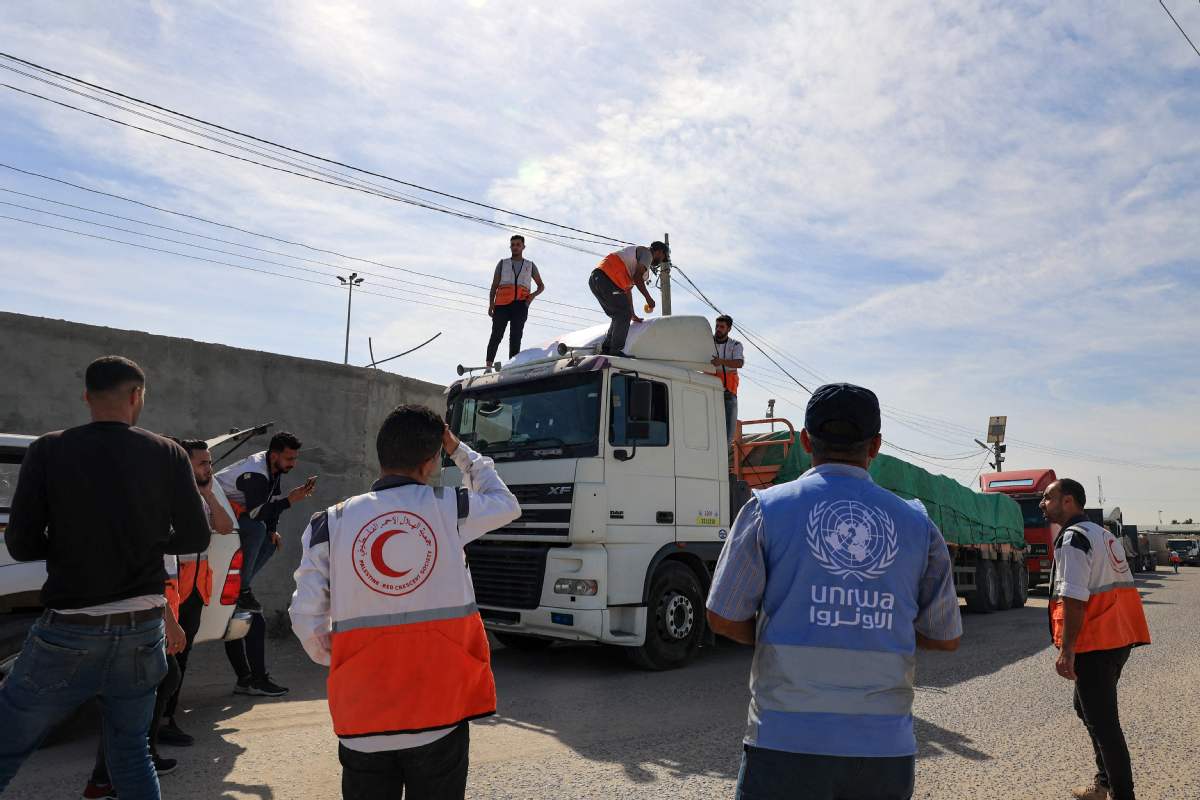
The border crossing between Egypt and the Gaza Strip opened on Saturday to allow humanitarian aid to trickle into the besieged Palestine territory for the first time since Israel sealed it off following a Hamas attack over two weeks ago.
Twenty trucks were allowed in on Saturday, and more trucks crossed into Gaza on Sunday, The Associated Press reported. In addition to 17 aid trucks reported by Egypt state media, seven fuel trucks escorted by United Nations vehicles were seen entering Gaza.
More than 200 trucks carrying 3,000 metric tons of aid have been waiting near the Rafah crossing for days, while Gaza's 2.3 million Palestinian residents — half of whom have fled their homes — are rationing food and drinking dirty water, AP reported.
Hospitals said they are running low on medical supplies and fuel for emergency generators amid a territory-wide power blackout. The UN agency for Palestinian refugees said it could run out of fuel in Gaza very soon.
Saturday's convoy carried 44,000 bottles of drinking water, a day's supply for 22,000 people, according to UNICEF.
The World Health Organization said four of the trucks carried medical supplies, including trauma medicine and portable trauma bags for first responders.
As Israeli airstrikes continued pounding Gaza, around 30 Arab and Western leaders attending a summit on Saturday in Cairo, Egypt, called for establishing a mechanism to guarantee the progress of peace talks and finding a just solution to end the Israel-Palestine conflict.
Egypt and Jordan harshly criticized Israel over its actions in Gaza at the Cairo Summit for Peace, which was initiated by Egyptian President Abdel Fattah al-Sisi, a sign that the two Western allies that made peace with Israel decades ago are losing patience with its war against Hamas.
United Nations Secretary-General Antonio Guterres urged sustained humanitarian aid to be delivered to Gaza. He said the grievances of the Palestinian people are legitimate and long, but nothing can justify the reprehensible attacks by Hamas that terrorized Israeli civilians. But the Hamas attacks "can never justify the collective punishment of the Palestinian people", he added.
Zhai Jun, China's special envoy on the Middle East issue, advocated the "two-state solution" at the summit and reiterated that China opposes and condemns all actions that harm civilians and violate international law.
Arab League Secretary-General Ahmed Aboul Gheit said the international community should agree to a comprehensive political settlement that guarantees Palestinian people their independent state.
The conflict has claimed more than 5,800 lives and wounded over 20,000 as of Saturday, according to the UN. The military wing of Hamas said in a statement on Friday that it had released two hostages, both United States citizens.
At a separate summit on Friday, leaders of the Association of Southeast Asian Nations and the Gulf Cooperation Council condemned all attacks against civilians and called for "a durable cease-fire" as the Middle East conflict intensified. They also called for the "most effective and efficient" access for humanitarian aid and the restoration of electricity and water services.
Prime Sarmiento in Hong Kong contributed to this story.
GAZA -- About 50 percent of the Palestinian residential units were partially or completely damaged by the ongoing Israeli attacks on the coastal enclave, a Palestinian official said on Sunday.
"The Israeli occupation is deliberately damaging the residential buildings, public facilities, and service facilities," Salama Maarouf, head of the Hamas-run government media office in Gaza, said in a press statement.
"Because of the intensifying Israeli airstrikes, more than 165,000 housing units were partially damaged and nearly 20,000 housing units were completely demolished or became uninhabitable," Maarouf added.
As a result, about 70 percent of local residents were displaced from their homes and headed to 220 shelter centers or other places throughout the Gaza Strip.
The Israeli airstrikes were triggered by a large-scale Hamas attack on Israeli military targets and towns on Oct 7, which has so far killed at least 1,400 people in Israel. The death toll of Palestinians from Israeli airstrikes on the Gaza Strip has risen to 4,651, the Hamas-run Health Ministry said on Sunday.

JERUSALEM -- An Israeli tank "accidentally" fired and hit an Egyptian military post on Sunday, the Israel Defense Forces (IDF) said in a statement.
The Egyptian post is located in the area of Kerem Shalom, near the Israel-Egypt border and southern Gaza Strip, amid heavy fighting between Israel and Hamas, a Palestinian Islamist group, in Gaza.
There were no immediate reports of casualties.
"The incident is being investigated and the details are under review," the Israeli military said. The military also expressed "sorrow regarding the incident."
BAGHDAD -- Iraqi Prime Minister Mohammed Shia' al-Sudani and French President Emmanuel Macron on Sunday called for a ceasefire in the Gaza Strip to avoid repercussions for regional and world peace.
During a phone call, the two leaders discussed the rapid developments in the region due to the ongoing conflict between Palestinians and Israelis, especially the bombing of the Gaza Strip that affects civilians, according to a statement issued by al-Sudani's media office.
The two sides emphasized that the continued escalation between Palestinians and Israelis had serious repercussions on regional and international peace and security, the statement said, adding that they agreed to maintain communication and joint efforts for a ceasefire and contain the conflict in order to reach comprehensive and just solutions.
For his part, Macron pointed out the need to take serious action to prevent the expansion of the conflict and save the lives of civilians, the statement said.
The statement added that al-Sudani and Macron agreed on the necessity of securing an immediate ceasefire and opening safe corridors for humanitarian aid to reach the besieged residents of Gaza.
On Oct 7, the Palestinian Islamic Resistance Movement (Hamas) launched a surprise attack by firing thousands of rockets against Israeli targets, prompting extensive airstrikes from the Israeli side. Hamas militants also infiltrated Israeli territory and took a significant number of hostages during the attack.
More than 1,400 people in Israel were killed in the attacks launched by Hamas, according to figures released by Israel's military. Israeli attacks have killed 4,651 Palestinians, according to figures released by the Hamas-run Health Ministry.
